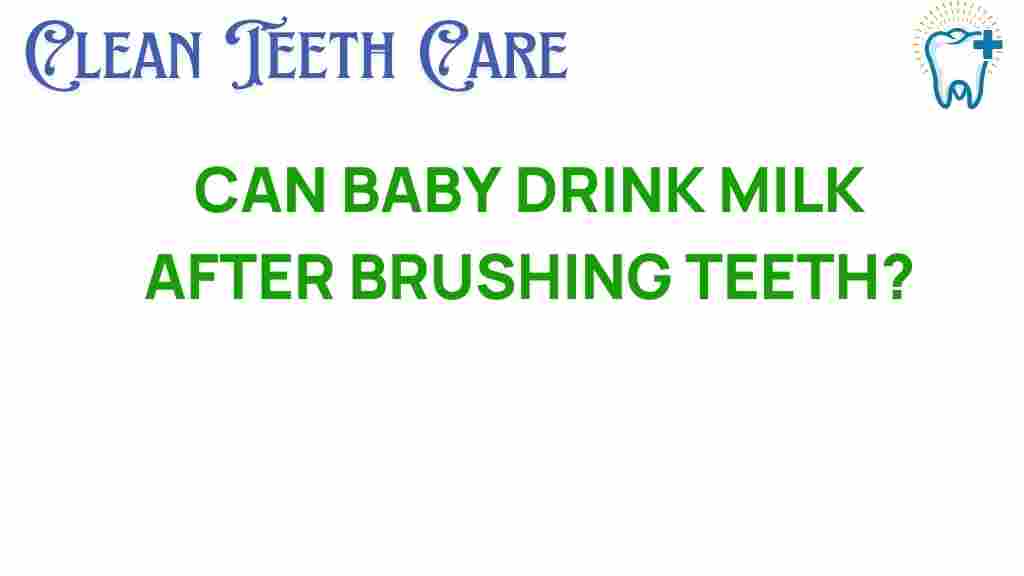The Surprising Truth: Can Baby Drink Milk After Brushing Teeth? – Baby Dental Health
As parents, we strive to ensure our little ones maintain optimal baby dental health. One common question that arises in the realm of oral hygiene is whether it’s safe for babies to drink milk after brushing their teeth. This article will explore this topic in-depth, shedding light on the implications for children’s teeth and offering guidance on dental care and healthy habits.
Understanding Baby Dental Health
Baby dental health is a crucial aspect of overall health and well-being. Proper care of children’s teeth not only prevents cavities but also sets the foundation for lifelong healthy habits. Early dental care can lead to better oral health outcomes as children grow. Here are some essential elements of baby dental health:
- Regular dental check-ups with a pediatric dentist.
- Establishing a routine for brushing teeth twice a day.
- Monitoring dietary habits, including milk consumption.
Brushing Teeth: Best Practices
Brushing your baby’s teeth is a fundamental aspect of their oral hygiene. Here are some best practices to ensure effective brushing:
- Use a soft-bristled toothbrush appropriate for their age.
- Apply a smear of fluoride toothpaste (for children over two years old).
- Brush in gentle circular motions, covering all surfaces of the teeth.
- Encourage your child to spit out the toothpaste, but not rinse immediately to allow fluoride to work.
Milk Consumption and Oral Hygiene
Milk is often considered a healthy beverage for babies due to its nutritional benefits, including calcium and vitamin D, which are essential for strong teeth and bones. However, the timing of milk consumption in relation to brushing teeth is critical.
After brushing, it is generally advisable to avoid giving your baby any food or drink, including milk. This is because consuming anything after brushing can wash away the protective fluoride layer and introduce sugars or acids that can harm their teeth.
The Impact of Drinking Milk Post-Brushing
Here are some important points to consider regarding the consumption of milk after brushing:
- Fluoride Efficacy: Brushing with fluoride toothpaste helps to strengthen enamel. Drinking milk afterwards can dilute the fluoride’s effectiveness.
- Increased Risk of Cavities: Milk contains lactose, a natural sugar. If consumed post-brushing, it can contribute to tooth decay.
- Establishing Healthy Habits: Encouraging your child to avoid eating or drinking right after brushing sets a precedent for good dental care habits.
Step-by-Step Process for Brushing Teeth and Timing Milk Consumption
To help parents navigate the delicate balance of brushing and milk consumption, here’s a step-by-step guide:
- Establish a Routine: Set a specific time for brushing teeth, ideally after breakfast and before bedtime.
- Brush Teeth: Use a soft toothbrush and fluoride toothpaste to brush your child’s teeth thoroughly.
- Rinse and Spit: Encourage your child to spit out excess toothpaste without rinsing their mouth immediately.
- Wait Before Offering Milk: Allow a waiting period of at least 30 minutes before offering milk or any other food or drink.
- Provide Milk: After the waiting period, you can safely offer milk as part of your child’s diet.
Pediatric Dentistry: Importance of Early Visits
Pediatric dentistry plays a significant role in ensuring your child’s oral hygiene and addressing any concerns early on. Here are some reasons to prioritize visits to a pediatric dentist:
- Early Detection: Regular check-ups can help identify potential issues before they become serious.
- Professional Guidance: Dentists can provide tailored advice on baby dental health, including brushing techniques and dietary recommendations.
- Building Comfort: Frequent visits help your child become accustomed to dental environments and procedures.
Troubleshooting Common Concerns
Here are some common concerns parents may have regarding their child’s brushing teeth routine and milk consumption, along with solutions:
Concern: My child refuses to brush their teeth.
Solution: Make brushing fun! Use a toothbrush with their favorite character or play a song during brushing time.
Concern: My child drinks milk before bed.
Solution: If your child prefers milk before bed, consider adjusting their schedule to ensure brushing occurs after milk consumption.
Concern: There are stains on my child’s teeth.
Solution: Schedule an appointment with a pediatric dentist to assess the stains and discuss possible treatments.
Establishing Healthy Habits
Establishing healthy oral hygiene habits early on is essential for maintaining baby dental health. Here are some tips to foster these habits:
- Lead by Example: Show your child how you brush your teeth and explain its importance.
- Make it a Family Activity: Brush your teeth together to create a fun and engaging routine.
- Use Positive Reinforcement: Praise your child for their brushing efforts to encourage consistency.
Conclusion
In conclusion, while milk is a nutritious choice for babies and toddlers, it is advisable to avoid giving milk immediately after brushing their teeth. This practice supports better baby dental health and contributes to establishing lifelong oral hygiene habits. By adhering to a consistent brushing routine, prioritizing pediatric dental visits, and understanding the implications of post-brushing habits, parents can ensure their children’s teeth remain healthy and strong.
For more information on children’s dental care, consider visiting Pediatric Dentistry Resource. Remember, investing in your child’s dental health today will pay dividends in their future smiles!
For further reading on the importance of healthy habits in children’s dental care, check out this comprehensive guide.
This article is in the category Hygiene and created by CleanTeethCare Team
